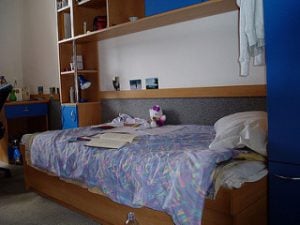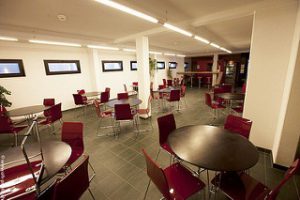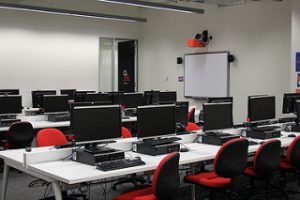When you need to hunker down and study hard, where do you go? In college, there are a lot of options for study venues, but each one has upsides and downsides. One study space might be beneficial to one student and distracting to another. Here are some pros and cons of the various places to study.
Your Room

Flickr user Jo
Pros:
- Controllable environment
Since it’s your space, you can control things like sound, lighting, and temperature (for the most part, anyway, it might be a bit trickier in the dorms). This customization is lacking in other spaces–tinker away until you find the configuration right for you.
- Access to Your Materials
You know where you store your pencils, highlighters, notes, textbooks, and snacks. Everything is right at hand.
- No Travel Time
You might have a ton of classes or little time to study between work and other activities, so hiking all the way out to the library might take up a valuable chunk of time. Your room is sort of like a hub, and studying there eliminates extra travel.
Cons:
- Easy to procrastinate
Let’s face it: rooms are meant to be comfy. With the beds, blankets, and favorite posters, your room might feel less like a study-space and more like a place to unwind after class. Without other students around, it might be a little too easy to switch from your reading your notes to watching Netflix.
- Distracting Roommates
Whether in the dorms or shared apartments, your roommates might be a tad disruptive. They could be chatting on the phone, cooking dinner, watching TV, or barging in with questions from time to time. Outside distractions are not super conducive to your studying.
- Limited Resources
You know how we said you just had all your materials at hand? Well, that means you only have your materials. No additional resource books, no library staff assistance, no writing center aid.
Common Space

Flickr user Les Roches
Pros:
- More room
Whether it’s an apartment living room or dorm hall common area, there’s just more room to lay out your stuff and breathe. Feeling cramped can seriously hinder your productivity, so stretch out if you can!
- Study-buddy Compatible
If you’re partnering up and quizzing each other, a common space is a great place to be. Again, with the additional room, you can spread out materials and have more seating without feeling cramped. It’s a great place for group projects and study sessions.
Cons:
- Other People
It could be roommates or other students in the common area, fact is: you’re in a common space. There might be competing study groups collaborating on a project or maybe somebody on Skype since the wifi in their room isn’t great. In common spaces, you can’t control who comes and goes.
- Limited Resources
You don’t have what you don’t bring with you. If you forget a book or highlighter, you’ll have to head back to your room and collect it. Also, you won’t have any additional materials that would be provided in other spaces like the library.

Library

Flickr user Tulane Public Relations
Pros:
- Resources!
Libraries are prime hunting grounds for research materials, books, and even videos. Library staff are there to point you in the right direction. A writing center might be nearby which can help you craft essays or revise papers. There are resources galore at the library. Not to mention that when you’re finished studying, you can rent a DVD or a good book to relax after a job well done.
- Productive Atmosphere
More often than not, if a student is in the library they’re there to study or work on projects. There is an air of productivity that can help you focus on the task at hand. Being in a public space might help some students refrain from procrastinating as well. And of course, libraries tend to be quiet, which many students find helpful.
- Study Cubicles
Many libraries have cubicles or even private study rooms available. Have a group project with a looming deadline? Book a time in a private study room so you can hunker down with all the library resources, but without the distraction of other students. Cubicles offer a sort of blinder to block out anything else going on in the library so you can focus.
Cons:
- Other People
The library is the quintessential space for studying; it’s a classic. As such, libraries can often be crowded with other students. Sure, most of them might be quiet, but some could be working on group projects or listening to music a that’s a little too loud. Not to mention you could have to jockey for a table or seat.
- Rules
No outside food or drink, cell-phones, or talking above a whisper. While not all libraries follow these specific rules, chances are there will still be some sort of policies that aren’t the most study-friendly–like you can only check out a certain number of books, or you’re not allowed to take a piece of reference material out of the room.
- Lack of Comfort
Since the library is a public space, you don’t exactly get to customize it to your personal standards. Libraries can be chilly or stuffy. Maybe they only have uncomfortable wooden chairs. Sometimes that fluorescent lightbulb just keeps flickering above you. The point is, you have little control over the environment.
Coffee Shop

Flickr user Kevin McShane
Pros:
- Not Dead Quiet
Some students prefer a little bit of noise over pure silence. Being in public can incite a mental responsibility to be on task rather than goofing off. A lot of times people go to coffee shops or cafes to get work done, so there can also be a collective atmosphere of productivity.
- Caffeine / Study Snacks
Best part about coffee shops? The coffee! If you need a little pick-me-up caffeine boost, there’s a barista ready to fill your order. Though it’s not recommended you go on a caffeine binge and pull an all-nighter, a cup of your favorite coffee can perk you up and give you that energy bonus to keep on plugging away. And of course, there are always plenty of good snacks.
Cons:
- Public
While some students prefer background noise, coffee shops can get downright loud. Baristas shout orders, friends catch up over a hot drink, students argue over who got the worst finals schedule–it can get hectic. There can be visual distractions galore too since people are always coming in and out.
- Lack of space
Odds are that there isn’t a whole lot of space in your favorite coffee shop. There may be a small handful of bigger tables, but those are almost always taken. Table hunting becomes an art as the cafe becomes more and more crowded. If you only managed to score a small table you probably won’t have as much room as you need for materials.
Outside

Flickr user laikolosse
Pros:
- Plenty of Space
If the weather’s nice you’ll find lots of students hanging out on the grassy spaces, catching some sun, throwing a Frisbee around, enjoying froyo, and–you guessed it–studying. Being outside allows you a ton of room to spread materials around or to have study-buddies join you.
- Relaxing
You can stretch and breathe outside, whereas somewhere indoors might feel more cramped. Fresh air, birdsong, and sunshine can take some of the stress of studying away, leaving you refreshed and ready to tackle the material. If you’re more relaxed, you’re more likely to absorb the material and perform better on tests.
Cons:
- Weather / Nature
Weather can change in an instant. A sunny blue-sky day can quickly become windy and blow papers and folders away. Any number of weather mishaps could strike–rain, hail, a thunderstorm. And let’s not forget that you’re in the great outdoors, that means sunburns, bugs, itchy grass, pollen allergies, and wind.
- Lack of Resources
If you study outside you’ll probably have access to the least amount of materials than anywhere else on campus. You may or may not have internet, you’ll have to carry all the books you need, there’s nowhere to plug in your computer or phone, and there are no staff nearby to answer any pressing questions.
Computer Lab

Flickr user Visible Procrastinations
Pros:
- Wi-Fi
Glorious Wi-Fi. Gone are the days where you could only use physical books and journals to do research papers. Now the internet has a practically unlimited plethora of information at your fingertips.
- Productive Atmosphere
For the most part, students are in the computer lab to get work done. There can be mostly silence with the sound of key-tapping filling the room helping you to stay focused.
- Tech Access
In addition to computers, you’re likely to find printers, scanners, and other technology in the lab. For tech-based projects, the lab is the perfect place to be. And there are usually staff nearby if any problems or questions arise.
Cons:
- Wi-Fi
We all know it’s more fun to scroll through Facebook or Twitter than it is scrolling through lecture notes. The internet can be a place of temptation away from studying. Wi-Fi is as much a blessing as it is a curse.
- Lack of space
There’s usually only space enough for a notebook and pen–the computer lab is dominated by computers, after all. If most of your required materials are online this isn’t as much of a problem, but even so, you might want to jot down notes on paper, and there just isn’t a whole lot of elbow room for that.
- Rules
Like the library, computer labs can have a host of rules–understandably so. Some labs ban food and drink entirely, others require that you leave your backpack at the front of the room. Whatever the case may be, some rules feel like an inconvenience to your studying.
You may have to do some exploring to discover which study spaces work best for you. There are a number of factors to each, so one option might work best for another student rather than for you. Happy studying!






